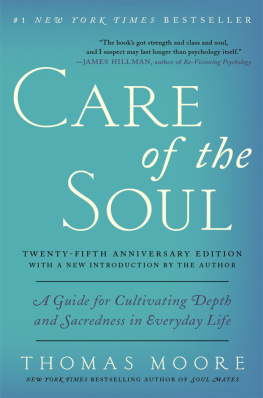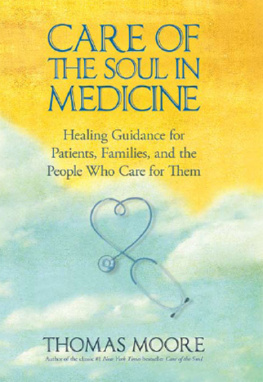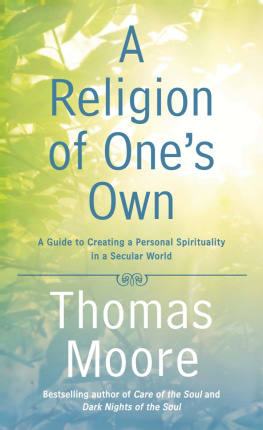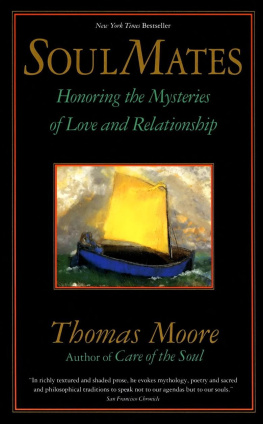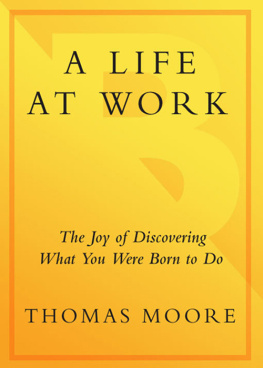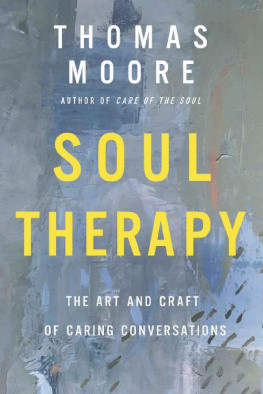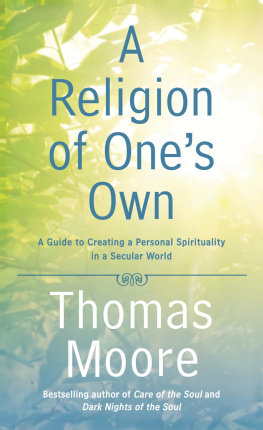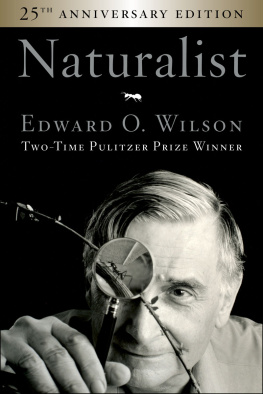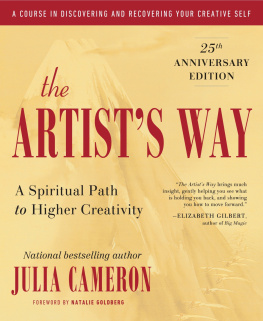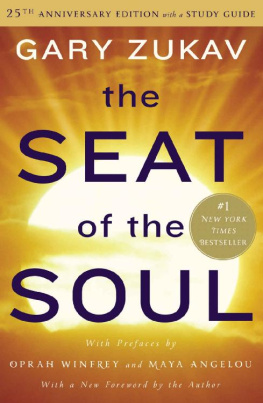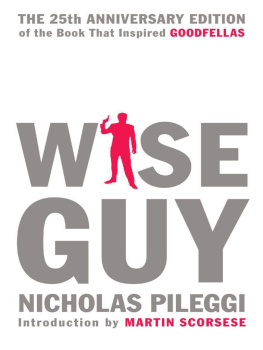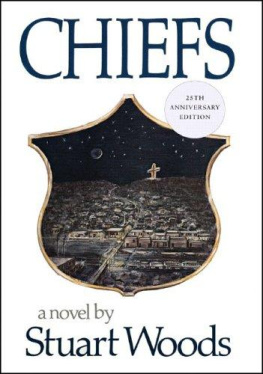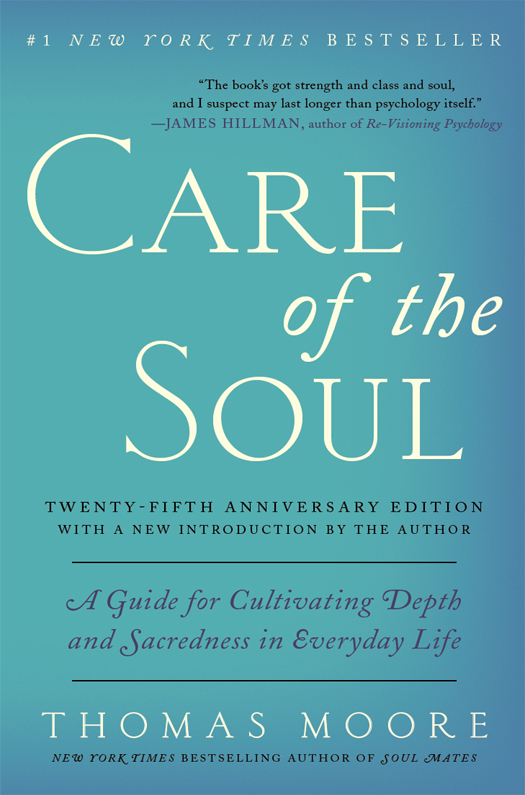There is the depth and originality of Mr. Moores observations... and a deeply consoling intelligence... that should draw many readers.
Phyllis Theroux, New York Times Book Review
Many thanks to Thomas Moore for these profound and timely insights.... Genuinely inspirational.
Kevin McCarthy, Bloomsbury Review
Invigorating, demanding, and revolutionary.
Publishers Weekly
A wonderful book. It will do much to free the world of the medical model of psychotherapy and to help people treasure as individual poetry what they formerly regarded as pathology.
Polly Berrien Berends, author of Whole Child/Whole Parent
Care of the Soul moved me deeply, in ways I only partially understand. It forced me to contemplate my own soulits likes and dislikes, its particularity.
Shepherd Bliss, Yoga Journal
This is an enthralling text. One feels good just reading it.... This book makes no claims to perfection; it is just a peaceful little island of good sense in a world where such a commodity is in all-too-short supply.
Richard Poliver, Bookpage
All too seldom one encounters a book as rich and thought-provoking as Care of the Soul.... Like Shakespeare or the writings of Joseph Campbell, almost every page reveals a treasure.
Jerry Pope, Journeymen
Thomas Moore is an authentic example of a new kind of therapista doctor of the soulwhich in our century has been in short supply.
Larry Dossey, M.D., author of Meaning and Medicine and Beyond Illness
Contents
Guide
While this book is a personal statement based on many years of experience as a psychotherapist, I am unusually indebted to several gifted friends who have inspired and guided me. I would like to thank Christopher Bamford for planting and working the seeds of the initial idea. Much of the thought in this book has come from my association with original thinkers who have taught us how to think about the soul, especially James Hillman and Robert Sardello. Id also like to thank Ben Sells, Terrie Murphy, and Sarah Jackson for reading parts of the manuscript. I am grateful to Charles Boer for his graceful translation of The Homeric Hymns. The Ann and Erlo Van Waveren Foundation provided funding to help me do the basic writing. Hugh Van Dusen, of HarperCollins, provided constant enthusiastic encouragement and advice. His warmth and deep culture gave soul to the sometimes challenging demands of publication. Jane Hirshfield worked very hard with amazing patience to get my sometimes esoteric use of language into shape. Michael Katz, my agent, brought a brilliant artists touch to the business and aesthetic aspects of the book, and he was a sensitive guiding companion during the writing and publishing process. Finally, I must thank Joan Hanley for urging me to go ever deeper in my search for ways of presenting possibilities for a soulful life.
When I wrote Care of the Soul, I was aware that I was resurrecting an old teaching. In Platos moving description of Socratess defense, when he was accused of misleading the youth and failing to observe the proper religious rituals, the esteemed teacher says that the most important thing we can do in life is work for the well-being of our souls: I do nothing other than urge young and old to care not just for their persons and property, but more so for the well-being of their souls. (Apology, 30B)
If you were to read that passage from the Apology in Greek, you would see that the word used for soul is psyche, the word found in our words psychology, psychiatry, and psychotherapy. Imagine if we restored the original sense of soul to those fields, how we might deepen them and make the necessary connections between psychology and spirituality. That is just what I have tried to do as I have taught care of the soul to psychiatrists and psychologists for many years. Care of the Soul is a manifesto or leaping-off point for that work.
I live and write in New England, and I have also found inspiration from writers from this region such as Ralph Waldo Emerson and Emily Dickinson. Throughout their work you will find the word soul.
Emerson, for instance, offered the insight that the soul doesnt develop in a straight line but in stages, like a caterpillar becoming a butterfly. Imagine your life as a series of initiations, as you go from one life-changing experience to the next. This perspective alone would take away some of the drudgery and sameness you may feel.
Dickinson said that the soul should always stand ajar, ready to respond to inspirations. Imagine living in such a way that you are always open to possibilities and intuitions. Again, your life would be less mechanical and predictable.
If you really want to become psychologically astute, read these writers before studying the psychologists. Add Walt Whitman to your list, the irrepressible poet who sang hymns to vitality and sensuality in his writing.
Whitman also described the soul again and again in sensual language, saying that the body electric, our body in all its sensuality, reveals the soul. Lovingly he describes all the body partsthe curve of the waist, the red jellies, and the bonesand concludes:
O I say these are not the parts and poems
of the body only, but of the soul,
O I say now these are the soul!
Finally, I base my work on the insights of two psychologistsin the original and proper sense of that termC. G. Jung and James Hillman. They offer each a lifetime of work, richly rooted in the long history of writings about the soul, and they make it personal and livable and suitably complex. Its impossible to pigeonhole either of these writers. They combine philosophy, theology, psychology, and art history into a new and unnamed field that our universities and business schools desperately need.
For me Care of the Soul was not intended as an easy, quick guide to solving lifes problems but the start of a deep exploration of the soul, which I find largely ignored today by individuals and the society at large. If we neglect our souls, we lose both our humanity and our individuality and risk becoming more like our machines and more absorbed into a crowd mentality. When we do notice the condition of our souls and do something positive, life problems ease and sometimes go away.
I thought I was writing as a serious practical philosopher, someone in love with wisdom, who believed in the power of subtle ideas to make life more effective and satisfying. From the comments Ive heard over twenty years, I think most readers took me that way, as a serious writer, a theologian exploring the deeply mysterious aspects of human life.
I think of self-help as superficial advice-giving. When I notice a book of mine in a self-help section of a bookstore, I think of all the hours I spent translating ancient texts from Latin and Greek, hunting for a thin slice of wisdom or a single insight. I recall the many times I have read the complicated eighteen volumes of Jung and listened intently during conversations with my old friend Hillman, as we tried to work out some subtle knot in human feeling or behavior.
When I write, I go for insights rather than explanations. To me, it takes time, reflection, and work to arrive at a fresh insight. On paper these insights may not look like much, but I find technical and research writing fairly useless when they fail to offer insight. I say all this to help the reader read this book differently than he or she might handle a typical modern work of psychology. Dont search for proofs; look for insight.

